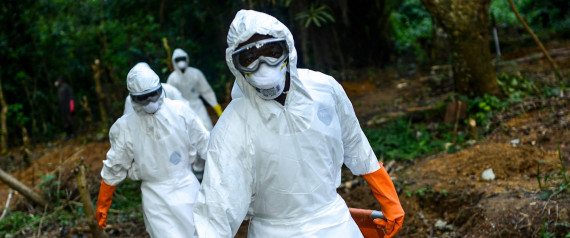Published on August 28, 2014
The epicenter of the Ebola crisis in Sierra Leone
sits in the rural Kailahun district. Nearly half of the country’s Ebola
cases have been found there. The province shares a border with Guinea
and Liberia, the two other nations hardest hit by the worst Ebola
outbreak in history.
ABOVE: A boy wanders through a field
of rice near the village of Dia, Sierra Leone, in August. Many of the
country’s Ebola cases are found in rural areas.
In Kailahun, the aid group Doctors Without Borders has established a
treatment center with more than 80 beds. Caring for Ebola patients is
difficult, stressful work. The virus spreads by contact with bodily
fluids, such as blood, urine and sweat. So medical staff must wear
specialized protective gear that covers them head to toe. Everything is
washed down with chlorinated water, as disinfection is a major concern.
There is no cure for Ebola, and survival rates hover around 50 percent.
Staff must not only care for patients, but they must carefully bury
the dead. Traditional practices require family members to wash the body
and touch it before burial. But someone who has died from Ebola is
especially contagious. The virus is literally spilling out of their
skin. Many infections are blamed on burial practices. So Red Cross teams
have been tasked with retrieving the bodies of people even suspected of
having the disease. More than 240 health-care workers have been
infected by Ebola during the West African outbreak. “The emotional
burden of doing this is high,” said Walter Lorenzi, head of mission for
Doctor Without Borders in Sierra Leone. “The stress, sometimes, can be
too much.”

Kailahun
Residents of Kailahun gather along a river at dusk in August. The Kailahun district, in eastern Sierra Leone, has been heavily affected by the ongoing Ebola outbreak. School has been suspended, and residents live in fear. A Doctors Without Borders treatment center in Kailahun is the largest in history. Caring for the disease’s victims has been incredibly stressful and dangerous.


Dia
Members of a Red Cross burial team take samples from a woman suspected of dying from Ebola in the village of Dia in August. The government of Sierra Leone mandates that all deaths in which the cause is unclear be treated as potential Ebola cases. Contact with the bodies of Ebola victims is a leading cause of virus transmission. “Safe burials” are conducted by the International Federation of the Red Cross in accordance with rigorous safety procedures. The workers must put on personal protective equipment before entering the home.


Sengema
Residents of Sengema, including relatives of a man suspected of dying of Ebola, gather in August to watch Red Cross workers prepare and take the man’s body. The dead bodies of Ebola victims are extremely infectious because the virus is transmitted by bodily fluids, such as sweat, urine and blood. Family and community members are encouraged not to touch the bodies of those suspected of dying from Ebola. As a result, traditional funeral ceremonies have been seriously disrupted by the outbreak. Bodies are buried away from residential areas to reduce the risk of infection.













